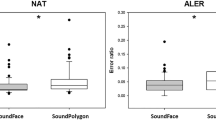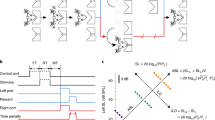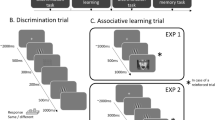Abstract
THE concept of stimulus-response (S-R) compatibility has been used mainly in the area of sensory-motor skills, where it was developed to explain why certain S-R pairs, said to conform to a population stereotype, were more easily learned than others1,2.
This is a preview of subscription content, access via your institution
Access options
Subscribe to this journal
Receive 51 print issues and online access
$199.00 per year
only $3.90 per issue
Buy this article
- Purchase on Springer Link
- Instant access to full article PDF
Prices may be subject to local taxes which are calculated during checkout
Similar content being viewed by others
References
Fitts, P. M., and Deininger, R. L., J. Exp. Psychol., 48, 483 (1954).
Alluisi, E. A., and Muller, P. F., J. Exp. Psychol., 55, 247 (1958).
Baddeley, A. D., Conrad, R., and Thomson, W. E., Nature, 186, 414 (1960).
Glaze, J. A., J. Genet. Psychol., 35, 255 (1928).
McGeoch, J. A., and Irion, A. L., The Psychology of Human Learning (Longmans Green, New York, 1952).
Siegel, S., Nonparametric Statistics for the Behavioral Sciences (McGraw-Hill, New York, 1956).
Author information
Authors and Affiliations
Rights and permissions
About this article
Cite this article
BADDELEY, A. Stimulus-Response Compatibility in the Paired-Associate Learning of Nonsense Syllables. Nature 191, 1327–1328 (1961). https://doi.org/10.1038/1911327a0
Issue Date:
DOI: https://doi.org/10.1038/1911327a0
Comments
By submitting a comment you agree to abide by our Terms and Community Guidelines. If you find something abusive or that does not comply with our terms or guidelines please flag it as inappropriate.



